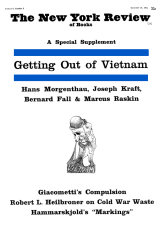In response to:
Mozart in the Stacks from the August 5, 1965 issue
To the Editors:
I write still under the shock of W. H. Auden’s remarks on the Mozart documentation of Otto Erich Deutsch. Their illustrious source renders them all the more shocking. Were Mr. Auden acquainted with Professor Deutsch (for whom I have a high regard) and with his work, I cannot believe that he would not bitterly regret what he has written. The characterization as an “anal madman” of one of the most distinguished of Anglo-Austrian musicologists is rendered doubly peculiar by the appearance in the same issue of The New York Review of Books of a quotation from a recent volume of poems, treating us to a discussion of the amenities of Mr. Auden’s Austrian water-closet.
With Mr. Auden’s statement that Professor Deutsch’s compilation is a nonbook, I am in complete agreement. Personally I see great virtue in the “nonbook” presentation of certain biographical or historical subjects. I greatly admire the chronological summaries that prefix the Pléiade editions of French classics. There are those subjects, Rimbaud, for example, about which the bare chronological facts are overwhelmingly eloquent. This method works best perhaps for those subjects for which only sparse and striking material is at hand, or at the other extreme for those for which virtually complete documentation exists. Of these latter, Mozart is such a subject. I doubt that anyone will ever write a better biography of Mozart than that furnished by his annotated collected letters and by the Köchel catalogue.
The publication Mr. Auden attacks is doubtless a translation of Mozart, die Dokumente seines Lebens, which appears in conjunction with a volume of collected Mozart iconography, a comrespondence, all of this as a supplement to a new critical edition of Mozart’s complete works. All of this would seem to justify the care for accuracy and completeness which characterizes Professor Deutsch’s publications. This method of letting an artist’s life and works tacitly emerge from a welter of seemingly unnecessary and commonplace detail can be extraordinarily successful, in the case of Mozart when viewed in conjunction with a correspondence that is so extraordinarily eloquent and relatively completely preserved. (It is less successful in the case of Mr. Deutsch’s comparable “non-book” on Handel, in revealing the man. Handel himself was not given to self-revelation. But it is very successful in revealing the ambience, in enmeshing us in the mess and the intrigues and journalistic nonsense from the midst of which the operas and oratorios had to struggle forth.)
What is less pardonable in such a nonbook, in which the literal transcription of the language, even the orthography of documents, is so valuable in bringing us palpably close to sources and to contact with an ambience and its personalities, is that it should be translated. This is where Mr. Auden’s anger might have been more justly directed toward publisher and translator than toward compiler. Mozart’s letters, some of the most personable and in their idiomatic way self-reevaling that have ever been written, lose immeasurably in translation. A miscellaneous collection of documents in varying styles and idioms can be completely stripped in translation of its potential poetic value. This is what appears to have escaped Mr. Auden, that miraculous emergence of music in Mozart’s Gesamtlebe und Werk from the ordinary and seemingly unimportant. Instead of a burst of ill-temper, we might have had a fine poem.
Ralph Kirkpatrick
Guilford, Connecticut
This Issue
September 16, 1965



